February 27, 2015
Dr. Hans Rausch was our family physician until I was seven or eight and he retired. I have a lousy memory for things of my childhood, but I well remember this man. He was short and chubby, wore oddly tailored and color clashing clothing, and sported a mustache that today I would recognize as ethnic. He spoke with a pronounced, German accent and had difficulty with English syntax and expressions. He’d tease me with a St. Nick chuckle, and he always called my mother ‘Mama.’ He had those old Highlight children’s magazines in his waiting room. I loved to go and see him. I suppose I remember him so well because he was so foreign. I didn’t know any other Germans when I was six, and I don’t remember any of my later doctors. The foreign, particularly to a six-year old, can be threatening. But rather than a memory of fear and regret, his gentle, kind character yields a soft, welcoming recall, and I’m involuntarily smiling as I write this.
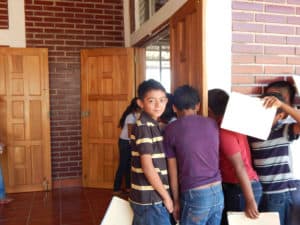
Brown University with Wingate University came down on a brigade last week to the small village of Guachipilincito. I never had patience enough to learn phonetics and I imagine most reading this didn’t either. Roughly, it’s pronounced “watch (light on the ‘t’ sound) + the letter ‘e’ + pea + lean + sea + toe.” When I think of foreign, I think of Guachipilincito. Though it’s only two or three miles from Concepción, it’s an hour and a half on foot and an hour by a four wheel drive vehicle. Birds can get there in a matter of minutes, but any creature limited to ground travel is subject to a challenging quest. It’s not a place to visit. Unless you live there, you don’t go there. Those who do live there, stay there, unless they need to stock up on supplies. The Guachipilincito people are poor, isolated, independent, and “of their own.” For persons from the US, there’s the foreignness of Honduras coupled with the foreignness of Guachipilincito.
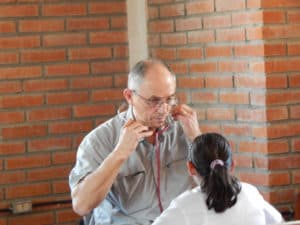
Laura and I visited Guachipilincito and the brigade last Tuesday. (You can read about how we almost didn’t make it there at https://manshipblog.wordpress.com/. But please finish this blog first.) We were surprised by what we found. It didn’t feel foreign at all. In fact, the overwhelming sense was one of familiarity. The doctors and the pharmacists were seeing children from the fourth, fifth and sixth grade. The children stood in line, not anxious or fearful, but joyful. Like all kids do, they fooled with one another, but no one was out of control or acting up. They waited in line with patience as if they had all done this a thousand times before. As they moved up close to their turn to enter the examining room, their smiles widened, not from insecurity, but rather with a joyful expectation. We peered into the examining room and spotted Dr. Emily. She was testing a little girl’s motor skills by raising her arms and asking the child to mirror her movement. Dr. Emily wears a brilliant smile, the movements are graceful and uninhibited, and though we can only see the girl’s back, it’s clear the game is thoroughly enjoyable. The scene is tribute to the beautiful ease of human connection.
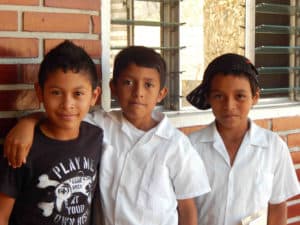
Dr. Emily, Dr. Wayne, and Dr. Tamika are all veterans on this brigade. They clearly like being in Guachipilincito. Robert, the pharmacology professor, and Kelly, the Wingate PharmD student are new to Guachipilincito. But even they are absorbed into this air of familiarity as they fill prescriptions for the children. All of them are in a place where everything is different, and yet they seem to be so at home. To the children of Guachipilincito, the brigade members cannot be anything other than foreign. To Dr. Emily, her husband Jim, Dr. Wayne, Dr. Tamika, Robert, and Kelly, the people of Guachipilincito cannot be anything other than foreign. But this is not what seems to matter. 
I wonder about this little girl who mirrors Dr. Emily raising and stretching her arms. Maybe she’ll live out her days in this small, secluded village of Guachipilincito. Maybe she’ll move out beyond the confines of such isolation and poverty. In either case, she will remember Dr. Emily. The sincerity of human kindness has taught her a priceless lesson. Language, customs, and culture are not the things that separate, limit or determine us. When employed with a willing and believing heart, they liberate us.
Listening to the Call (Guachi Brigade)
Not in Wisconsin Anymore…
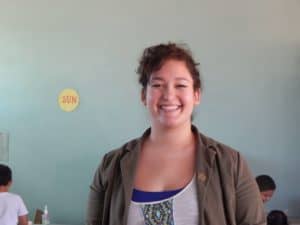
February 2, 2015
My bias toward Wisconsonian culture is primarily based on the limiting view of crazed Green Bay Packers fans wearing cheese wedge slices as hats. Additionally, as a haughty, New England, right coaster, I lump Wisconsin, Michigan, and Minnesota together. It’s really, really, really cold there, two or three days of summer in August at the most, and anyone purposely living under those conditions is very suspect. There aren’t any cities, everyone is a rural farmer, and the Lutheran Church forms everybody’s moral conscience. I blame the latter on NPR and Garrison Keillor. My bias of Wisconsin provincialism and narrow-mindedness was well-formed until just recently.
In January, Marcia LaSalle, a Milwaukee, Wisconsin native, arrived in Camasca, Intibucá, Honduras to begin four months of volunteer service at the Good Shepherd Bilingual School. Though her surname is French, her father is Puerto Rican. Her home life implied cultural diversity even as her mother, by Marcia’s own description, might have stepped right out of a Leave It To Beaver episode. Marcia visited Puerto Rico and her grandparents in Aguadilla, PR as a child and is close to many family members on her father’s side. Thus, she was acquainted with Spanish, but her father chose not to speak Spanish in the home. Marcia is very proud of her Latina heritage and wished she had learned more Spanish as a child. As a 21 year old adult, she is now becoming fluent in Spanish, having lived and traveled in Spain and now in Honduras. Not at all fearful or timid, seeking to expand her experiential horizon, she studied in England. The Wisconsin world traveler decided to spend the next four months in Honduras after completing the majority of her course requirements at St. Norbert’s College a semester early. When she returns in May she will have her BA in Anthropology.
Apart from that liberal, cosmopolitan, adventure-seeking, Wisconsin spirit, what brought Marcia to Honduras? A childhood friend spent some time here in Honduras with Shoulder to Shoulder. Whereas that had to have been influential, it’s perhaps best understood as presenting her the door to opportunity. Choosing to open that door was not in order to follow her friend, but to sate her own spiritual quest. Marcia witnesses an inner drive to meet and know others outside her own comfort zone. It is no surprise that she majored in anthropology. She admits to a fascination with culture. How is it that we can be so different, and yet so the same, and why? Most of us are content to be with others who act, think, and feel in similar ways. There’s a safety in sameness. But Marcia discovered that the best way to be pulled and challenged, to be self-reflective and to grow, is to feel just a little insecure around persons unlike oneself.
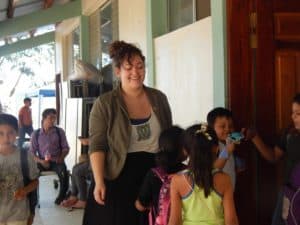
Marcia is at our bilingual school. Though she makes no claims on either being, or wanting to be, a teacher, she is present and sharing with the children. She’s teaching them English as they are helping her to hone her Spanish. They are communicating. More importantly, they are reaching out across culture, respecting that which is different and celebrating that which is the same. As a true anthropologist, Marcia is learning and teaching what is most important, even beautiful, about being human. Thanks Marcia. I will never again think of a Wisconsin with such limiting, narrow bias.
Perhaps you, even as you’re reading this, feel a certain tug to place yourself outside of your comfort zone. Maybe you would like to live in a developing country, serve and be served by the persons you would meet. Perhaps you have a little knowledge of Spanish, or a lot, or you just want the challenge of it all. If this describes you, maybe you should consider volunteering. Give it some serious thought. You can start by looking at the possibilities with Shoulder to Shoulder at https://www.shouldertoshoulder.org/volunteer-opportunities.


